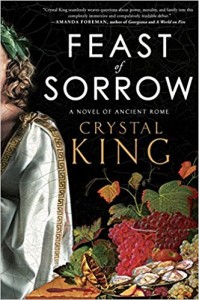 I have to confess something to you before we get started. I finished this book months ago. By “finished”, I mean I read it from front to back. So why didn’t I crank out a review earlier? Well one reason; I kept going back. King’s depth of historical research was absolutely riveting, and I couldn’t resist going back and re-reading bits here and there. The way she’s able to blend fiction, cultural anthropology, and history is brilliant. But I’m getting ahead of myself, aren’t I?
I have to confess something to you before we get started. I finished this book months ago. By “finished”, I mean I read it from front to back. So why didn’t I crank out a review earlier? Well one reason; I kept going back. King’s depth of historical research was absolutely riveting, and I couldn’t resist going back and re-reading bits here and there. The way she’s able to blend fiction, cultural anthropology, and history is brilliant. But I’m getting ahead of myself, aren’t I?
Let’s start with the story. Young Thrasius, a Roman slave, is sold to the house of Marcus Gavius Apicius. But Thrasius is not just any slave; Thrasius is to be the Coquus, or head cook, because of his culinary artistry. And Apicius has dreams of being the culinary adviser to none other than Caesar himself, sees Thrasius as the way to do just that. Dream big, I say. Luckily for Apicius, Thrasius is truly a genius in the kitchen, and soon everyone who is anyone is clamoring for a seat at one of Apicius’ dinners. But with great renown comes jealousy, and Apicius is quickly targeted by Lucius Aelius Sejanus, a man with ties to Tiberius Caesar. Sejanus wants to be Caesar’s culinary adviser as well, and the bad blood between Sejanus and Apicius goes back a long way. What’s Thrasius to do? Well, he cooks, he tries his best to dodge intrigue, makes a friend of Apicius’ body slave Sotas, and yearns to make even more of Passia, the beautiful maid and caregiver to Apicius’ daughter Apicata.
If that last paragraph sounds like a whole lot to wrap your mind around, it is. Sorrow has a level of intrigue worthy of George R. R. Martin’s Song of Ice and Fire. And it’s spellbinding. And if the name Apicius seems familiar to you, you’re not wrong; the historical Apicius was “a Roman gourmet and lover of luxury”, and the author of the oldest cookbook that we have on record. You’ll notice several other historical figures here too, including Tiberius Caesar and his family, and get an in-depth look at the world they lived in.
Speaking of the world King writes about, I still can’t get over the fascinating level of research King put in. I’ve mentioned it before, but it’s worth really getting into. I adore cultural anthropology, and the fact that King read many different Roman texts, including works on “architecture, slavery, politics and culture”? Well, she had me at Pliny the Elder. She truly did. Sorrow is so thoroughly researched it feels as if her tale is exactly what happened, instead of what possibly could have.
King took the historical Apicius, along with her extensive research, and crafted a page-turner of a story that will have you staying up ‘til the wee hours. Her use of Thrasius as the main character (and lens by which the events reveal themselves) makes the story come alive with Upstairs/Downstairs intrigue, along with the overarching Patrician machinations. Even the start of each section gives readers something to pore over, as King takes tidbits from Apicius’ “On Cookery”. They feel like an amuse-bouche for each new section, or perhaps a palate-cleanser so we can dive right back in.
I couldn’t put this book down, I absolutely had to find out what happened next, until the last page turned. And then after I was finished, I went back to sections that had a particularly lovely attention to detail – there are a lot of ‘em here – just so I could marvel at King’s ability to lay out incredible amounts of historical data without it feeling like so much padded exposition. King makes history a treat, and is right up there with Philippa Gregory and James Clavell when it comes to page-turning historical drama. Come for the fascinating premise, stay for the amazing characters and wonderful way King has with prose.
Sorrow can be read any time of year, but I think it lends itself particularly well to the time just before all our fall and winter holidays come upon us. While you’re trying to figure out how to plan your own feasts, why not put your feet up and read about Coquus Thrasius, his master Apicius, and how they had to plan theirs? At least you know you don’t have to worry about guests wanting to murder you…or do you? I won’t judge your dinner guests if you don’t judge mine.
